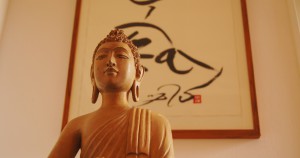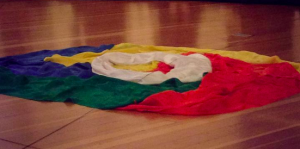Friday
Featured StoriesCompassionate Exchange
 …an Active Ingredient in Cultivating Good Relations
…an Active Ingredient in Cultivating Good Relations
by Acharya Melissa Moore and Shastri Sandra Ladley
You know what it’s like when you walk into work, your home, or a friend’s house and you notice that your colleague, partner or friend appear to be in a bad mood? What happens? Usually we don’t say anything but we begin to act – or react – to that person based on that perception, as if we know what’s going on.
Our innate and extraordinary human capacity to pick up on others’ moods and feelings can be a force for good yet most of the time it seems to lead to a lot of misunderstandings and confusion. We see and feel the unsaid and almost instantly we’re thinking, ‘They don’t like me,’ ‘They’re angry,’ and then we behave based on that thinking. This gets us into trouble because we’re reacting to others through what in contemplative psychology is called ‘exchange.’ Exchange is the human ability to feel the feelings of another person, but we don’t have a context or method for connecting to the other person’s truth.
‘Exchange’ is a non-verbal phenomenon that’s happening all the time. We’re swimming in it and it’s constantly occurring in both dramatic and subtle ways. It occurs when we’re standing next to someone on a street corner and they almost get hit by a bus. We viscerally experience their fear and alarm with them and it’s like we were almost hit by the bus too.
It’s happening when we walk into a room and sense there’s a lot of tension going on in a group, or that people are getting along really well. We may not know the content of what’s going on but we feel it. Exchange is the capacity and potential we have to experience others without concept, the ability to feel and experience others fully and completely in the present moment.
In contemplative psychology we train this capacity to exchange with others into compassionate exchange – first through the practice of meditation and then through the narrative discipline of body, speech and mind presentation and compassionate exchange groups.
 In compassionate exchange, we never interpret what we are feeling. Instead we open to the feelings that arise and offer a clean and simple reflection of what we are experiencing. Contemplative exchange practice – articulating our experience as it is happening and recognizing and refraining from interpretation – is the healing ingredient of contemplative psychology.
In compassionate exchange, we never interpret what we are feeling. Instead we open to the feelings that arise and offer a clean and simple reflection of what we are experiencing. Contemplative exchange practice – articulating our experience as it is happening and recognizing and refraining from interpretation – is the healing ingredient of contemplative psychology.
Compassionate exchange is something we are all capable of learning, and yet it must be trained and cultivated as an active embodiment of kindness in relating to others. Like all contemplative disciplines, our ability to practice this hinges on the potency and strength of mindfulness awareness. We train in coming back to the present moment and speaking the microscopic truth of our experience, without judgement or interpretation.
Compassionate exchange is the grist of the contemplative psychology training program, a journey toward learning how to be of more benefit in in our relationships and work with others. The training curriculum and group experience helps students trust their ability to exchange and learn how to utilize it as a skilful method.
For example, perhaps we’re in a discussion with a co-worker and suddenly there’s a lot of struggle and stress, disproportionate to the discussion. With training, we can liberate the situation by offering an exchange. We can stop, tune in and thoughtfully offer our perception and experience of the present moment: ‘I’m feeling a lot of tension in my throat right now, what’s going on?’, or ‘I’m having trouble focusing because I feel a sense of struggle in the room, what do you think is really going on?’
Always owning our exchange without judgement, and being curious enough to feel and then speak up about our experience can have transformative and beneficial effects. It may sound trite or easy but it actually takes a lot of awareness and training. Like everything psychological, it takes a safe container to discover how omnipresent exchange is and then an environment of like-minded people with which to train in putting voice to our exchange.
Training in compassionate exchange is just one of the elements of Karuna Training, a two-year certificate program in contemplative psychology. Originally drawn from the Naropa University MA program, Karuna Training started in 1997 in Germany, and is now running in six European countries. Last fall the first North American cycle commenced in the Bay Area in California and another two-year cycle is planned to start in Seattle Washington in fall 2015.
For more information on Karuna Training, and to apply, please go to: www.karunatraining.com
~~
 Acharya Melissa Moore, PhD., has been a Shambhalian since 1979. She received her Master’s degree from Naropa and a PhD in Psychological Anthropology from California Institute of Integral Studies. She became an Acharya in 2012. Melissa was co-founding Director of The Karuna Training, a professional training in Contemplative Psychology offered throughout Europe and currently happening in Northern California. Melissa is currently the founding Director of The Felton Research and Training Institute in San Francisco dedicated to raising the bar in the quality of services provided in community mental health.
Acharya Melissa Moore, PhD., has been a Shambhalian since 1979. She received her Master’s degree from Naropa and a PhD in Psychological Anthropology from California Institute of Integral Studies. She became an Acharya in 2012. Melissa was co-founding Director of The Karuna Training, a professional training in Contemplative Psychology offered throughout Europe and currently happening in Northern California. Melissa is currently the founding Director of The Felton Research and Training Institute in San Francisco dedicated to raising the bar in the quality of services provided in community mental health.

















